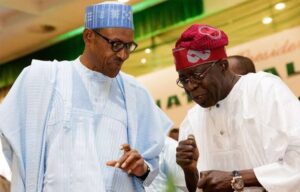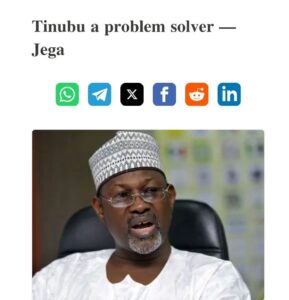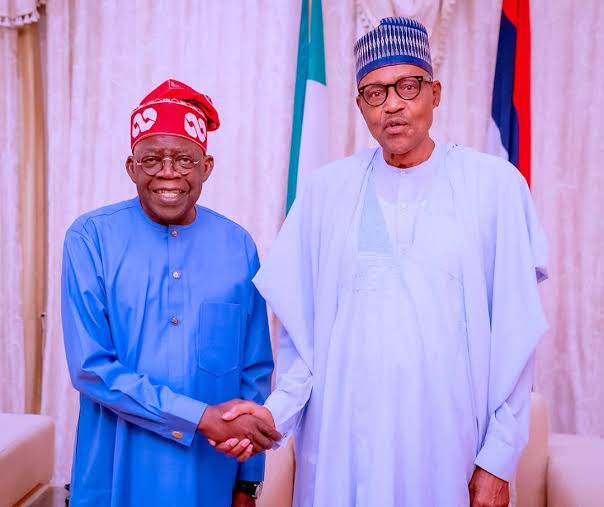By Dr. G. Fraser. MFR.
The National Patriots.
HeadlineNews.News Investigative & Editorial Board.
Published: July 25, 2025
HEADLINENEWS.NEWS EXCLUSIVE:
Opinion Analysis & Critique.
RED FLAG, NOT RED ALERT:
In a recently circulated essay titled “Red Alert from Fulani Hegemonists: Systematic Succession Policy”, political analyst Dahiru Yusuf Yabo accuses President Bola Ahmed Tinubu of orchestrating a covert ethnic secessionist agenda disguised as economic reform.
After extensive review, we find no factual basis, data, or balanced logic in Yabo’s submission. His article probably sponsored is riddled with misleading assumptions, zero empirical backing, and a deliberate twisting of national policy into ethnic fear-mongering.
It must be stated upfront: This narrative is reckless, dangerously speculative, and an insult to the intelligence of millions of Nigerians across every geopolitical zone.

Yabo’s Main Claims: Conspiracy Without Proof
What Yabo alleges:
Tinubu’s economic reforms, including privatization and concessions, are part of a secret Oodua Republic agenda. An attempt to blackmail the President to neglect the SW zone which has been neglected over the last 25yrs.
Federal assets are being “moved” to Lagos/Yoruba interests has no iota of truth. The writer should substantiate his claims with facts and figures.
Appointments favor the South-West to the exclusion of the North. The latest list of all appointees over the last 2 years till date being released by the Presidency confirm nationwide consideration for appointments on merit.
Privatization of assets like refineries, ports, and universities is a form of economic sabotage to weaken Northern control. Aliko Dangote, AbdulSamad Rabiu, TY Danjuma and other Northerners in the Oil& Gas sector are principal entrepreneurs in the economic sector.
What’s missing in Yabo’s sponsored report:
- Hard data.
- Federal budgetary analysis.
- Constitutional references.
- Evidence of disparity.
- Any credible source or verified quote.

Instead, Yabo presents a personal political paranoia, camouflaged in a nationalist tone, built entirely on suspicion and ethnic provocation.
Historical Context Matters — And Yabo Ignores It
For over 25 years, Northern Nigeria has held the greatest influence over national power, with presidents including:
- Shehu Shagari (1979–1983),
- Umaru Musa Yar’Adua (2007–2010),
- Muhammadu Buhari (2015–2023)
Yet in that time, Northern development lagged behind, with poverty, insecurity, and low human capital indices worsening. Was this the result of Yoruba marginalization? No — it was systemic leadership failure, including poor governance at the state level.
President Tinubu inherited a broken system and initiated reforms that serve all six geopolitical zones, not one ethnic bloc.
The Facts: The North Has Benefitted Most Under Tinubu
Let’s talk data — not imagination.
In just two years, President Tinubu’s government has:
- Initiated 40+ federal infrastructure projects across the North
- Established the Northwest and Northcentral Development Commissions
- Continued funding for the Northeast Development Commission
- Expanded healthcare, rail, road, power, and agriculture funding at unprecedented levels across Northern states

Dr. G. Fraser, MFR, Governance Consultant:
“This is the first administration that directly intervened in Northern capital infrastructure with federal resources — despite it being the role of state governors. That’s national unity, not tribal supremacy.”
So, why would someone claim a conspiracy against the North when Northern Nigeria is receiving more federal development than any other zone?
Privatization Is Policy — Not Plot
Nigeria’s privatization drive did not start under Tinubu. It began under Obasanjo, continued under Yar’Adua, and was accelerated under Buhari.
From NITEL to power distribution companies, the goal was to reduce inefficiency, stop leakages, and enhance service delivery. That’s what President Tinubu is doing — legally, transparently, and constitutionally.
President Tinubu, GCFR:
“We must stop government from doing business. Our duty is to create the environment for private enterprise, not run it poorly.”
Yabo’s worry that federal universities may be commercialized is equally misleading — no federal university has been sold or privatized. What exists is a funding partnership reform, driven by necessity, not ideology.
Comparative Global Reality
Countries like India, Brazil, Egypt, and Rwanda privatized their bloated public assets to boost national productivity.
Paul Kagame (President of Rwanda):
“You build your country by making tough decisions — not by running deficits to satisfy old fears.”
Is Kagame accused of ethnic successionism when he builds in Kigali? Why then should Tinubu, who builds across Nigeria, be accused of tribal betrayal?
Appointments Based on Capacity, Not Cronyism
President Tinubu has appointed Nigerians from all backgrounds — North, South, Christian, Muslim, men, and women. What he has not done is appoint incompetents to key positions to satisfy regional demands.
Vice President Kashim Shettima, GCON:
“This government is not about ethnic window-dressing. It’s about delivery.”
On the Constitution: State Governors Are Responsible for State Development
Yabo’s ignorance of the 1999 Constitution is glaring. The law is clear:
Second Schedule, Part II, Section 1(a–c):
“The State Government shall provide for health, education, roads, and social welfare within its jurisdiction.”
President Tinubu has still stepped in — not because he must, but because governance demands leadership, not excuses.
Why Fear an Oodua Agenda, But Not Biafra or Arewa?
If Yabo sees the Yoruba call for self-determination as a red flag, what about:
- IPOB’s agitation in the South-East?
- Arewa youth declarations in the North?
- Resource control demands in the Niger Delta?
- Why is economic development in Lagos due to its viability and position as the fastest growing hub in black africa seen as a plot, but underdevelopment in Zamfara not seen as failure?

This ethnic double standard is toxic, and Nigerians must not fall for it.
Final Thought: Unity in Diversity — Not Division by Deceit
Former President Olusegun Obasanjo, GCFR:
“Nigeria will only grow when we stop seeing every reform as a tribal conspiracy.”
President Tinubu’s reforms are for Nigeria, not Yorubaland. His policies empower the private sector, rebuild failing systems, and include every zone — even those with historically high political power but low development delivery.
HeadlineNews.News Editorial:
“What we need now is civic maturity — not ethnic mischief. The future is for builders, not fearmongers.”
Verdict:
Dahiru Yusuf Yabo’s “Red Alert” is a red herring — misleading, divisive, and deeply flawed. It should be read as a political pamphlet, not a credible analysis.
Nigerians must see through the smoke and support reforms that unite — not false alarms that divide.
The National Patriots.
Published by HeadlineNews.News — Committed to truth, not tribalism.

“RED ALERT” From FULANI Hegemonists !
SYSTEMATIC SUCCESSION POLICY: President Tinubu’s Sale of Public Assets and the Oodua Republic Agenda – A Strategic Concern
The recent flurry of economic reforms under President Bola Ahmed Tinubu—marked by the aggressive privatization of public assets including federal universities, refineries, and major economic institutions—raises critical questions about intent, national interest, and the long-term political vision behind these moves. While many are debating the economic merits of these policies, a deeper, strategic interpretation links them to a possible Systematic Succession Policy aimed at economic consolidation and political secession: an Oodua Republic agenda under the cloak of economic liberalization.
I. The Policy Actions: A Pattern Beyond Coincidence
The pattern is too coordinated to be accidental:
Sales of Critical National Assets:
Refineries (Port Harcourt, Warri, Kaduna) are being outsourced or sold.
Airports and seaports are reportedly undergoing PPP or outright concession models.
Power distribution and transmission infrastructure is being transferred to private hands.
Privatization or commercialization efforts are now touching federal universities, undermining national access to education.
Concentration of Economic Power in Lagos/Yoruba Interests:
Major economic institutions are being steered to Lagos: customs modernization, ports automation, fintech headquarters, and trade policy centralization.
Appointments and contracts increasingly favor those from the South-West, sidelining federal character.
Institutions like NNPC, CBN, FIRS, FAAN, and NSIA are undergoing reforms or relocations that gradually diminish Northern economic influence.
II. The Underlying Agenda: Toward Economic Secession?
While the government promotes these moves as efficiency-driven, critics argue that this reflects a systematic strategy to strip the Nigerian federation of its shared assets, concentrating economic infrastructure and wealth in the South-West, especially Lagos.
This policy trajectory supports two key outcomes:
1. Neutralization of Federal Economic Control:
By selling off or weakening national assets, Tinubu’s government could be engineering a post-federalist economic reality where the Nigerian State owns nothing and controls little—making a future breakup or regional autonomy less complex and less contentious.
2. Empowerment of a Proto-Oodua Republic:
The economic nerve center—ports, telecoms, banks, energy distribution, customs revenue, and tax control—is being firmly planted in the Yoruba heartland. When political succession arises or national disintegration becomes real, the South-West would have the infrastructure, assets, and global economic linkages to function independently.
III. Strategic Implications for Nigeria
Undermining National Unity:
Selling national assets without a strong federal consensus sends a dangerous signal. It deprives Nigeria of strategic economic leverage and undermines the social contract, especially for regions that feel increasingly marginalized.
Ethnic Economic Domination:
The monopolization of post-privatization entities by cronies and kinsmen entrenches ethnic capitalism, widening the inequality gap and deepening regional suspicion.
Weakening Northern Bargaining Power:
With no economic leverage, the North could become perpetually dependent or easily expendable in any post-2027 political realignment.
IV. Lessons from History and Regional Movements
Like the Biafran secession attempt in the 1960s, today’s strategy appears more calculated, non-militaristic, and economically premeditated. Rather than launching a frontal separatist movement, President Tinubu’s government seems to be using legal frameworks and policy decisions to lay the foundation for a soft exit from the federation—through wealth accumulation, asset control, and eventual cultural-political mobilization.
V. Recommendations and Counter-Strategy
To preserve the federal structure and ensure equity:
1. Immediate Suspension of Public Asset Sales pending a national conference and regional consultation.
2. Rebalancing of Economic Appointments and institution relocations to reflect true federal character.
3. Establishment of a National Economic Intelligence Panel to audit privatizations from 2023.
4. Constitutional Restructuring, not silent disintegration, to address long-standing regional grievances and promote a fairer revenue-sharing formula.
Conclusion: “Systematic Succession” or Silent Secession?
The policies of the Tinubu administration must be scrutinized not only for their economic impact but also for their geopolitical and nationalist implications. If unchecked, they risk fostering a future where Nigeria is economically hollowed out, politically fractured, and regionally enslaved to the dominance of one bloc.
This is not just a matter of privatization. It is a question of national survival.
Dahiru Yusuf Yabo
Political & Security Analyst
13th July 2025

Headlinenews.news Commentaries ©️
“Yabo’s Red Alert Is a Red Herring: False Alarms, No Facts”
Excerpt:
“There’s no data, no figures, no verified evidence — just ethnic paranoia wrapped in conspiracy.”
Quote – Dr. G. Fraser, MFR, Governance Consultant:
“Policies should be measured by national impact, not regional suspicion. Nigeria needs reformers, not rumor merchants.”

Comment:
Yabo’s report fails every test of responsible analysis. It is driven by fear, not facts — and Nigeria deserves better.
“President Tinubu: ‘We’re Building a Nation, Not a Region’”
Excerpt:
“Over 40 strategic federal projects are active in the North alone — more than any zone since 1999.”
Quote – President Bola Ahmed Tinubu, GCFR:
“My loyalty is to Nigeria, not to a tribe. Unity cannot be achieved by division or propaganda.”
Comment:
Tinubu’s record speaks louder than Yabo’s theories. Leadership is about building bridges — not drawing battle lines.
“Privatization Isn’t Ethnic — It’s Economic Survival”
Excerpt:
“Asset sales and PPP reforms are global economic recovery tools — not tribal handovers.”
Quote – Paul Kagame, President of Rwanda:
“You don’t grow an economy by holding onto broken systems. You grow by letting competence lead.”
Comment:
What Tinubu is doing mirrors best practice globally. Only the uninformed interpret national reform as ethnic retreat.
“Yabo Ignores the Constitution — Development Is a State Responsibility”
Excerpt:
“The 1999 Constitution places roads, healthcare, and education within the states’ jurisdiction — not the Presidency.”
Quote – Dr. G. Fraser, MFR:
“The loudest critics are often the quietest performers in their own domains. Where are the Governors in this conversation?”
Comment:
Blaming the President for what Governors failed to deliver is dishonest — and dangerously misleading.
“Tinubu’s Meritocracy Model Is the Future Nigeria Needs”
Excerpt:
“Appointments under Tinubu are driven by competence, not compensation — and the nation is better for it.”
Quote – Ngozi Okonjo-Iweala, WTO DG:
“Good governance starts when appointments stop being rewards and start being responsibilities.”
Comment:
The President has rejected mediocrity and embraced merit — something Nigeria has needed for decades.
“Unity in Diversity: Tinubu’s Vision Is National, Not Tribal”
Excerpt:
“With commissions established for all regions, Tinubu has shown inclusive leadership unmatched in modern Nigeria.”
Quote – Nelson Mandela:
“A good head and a good heart are always a formidable combination.”
Comment:
By balancing development across all zones, Tinubu isn’t dividing Nigeria — he’s stitching it back together.
“Ethnic Economics Is a Myth — Reform Is for Every Nigerian”
Excerpt:
“Ports, roads, rails, energy — these serve all Nigerians, not one tribe. Yabo’s tribal narrative cannot erase this.”
Quote – President Bola Ahmed Tinubu, GCFR:
“I won’t lead a sectional government. I will lead a reformist government. That is my promise and my path.”
Comment:
The nation is watching. And it sees clearly: Tinubu is focused on rebuilding a country — not on constructing tribal empires.
Headlinenews.news Special Publication ©️

“This is not just about agriculture. It is about national security, economic growth, and sustainable development. If we manage this properly, we can drastically reduce the farmer-herder conflicts, boost rural livelihoods, reduce poverty, and improve food security across the country. President Tinubu has shown courage by addressing a longstanding problem with a practical, forward-looking solution,” he added.




